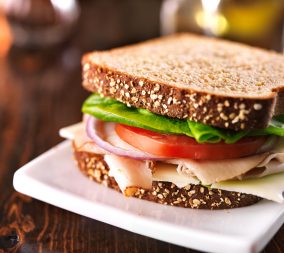If you’re pregnant, odds are good that someone has told you not to eat deli meat. Why? Listeria. Listeria monocytogenes is a bacterium commonly found in soil, water, and some animals. When food contaminated by Listeria is consumed, it can cause listeriosis, a rare but potentially serious illness. But why is everyone so obsessed with deli meat? Well, it’s because Listeria can live and thrive in the cold, which sets it apart from most other bugs that cause food borne illness.
The other tricky thing about Listeria is its affinity for the placenta. If the bacteria translocates from the gut of a pregnant individual into their bloodstream, it can make its way to the fetus via the placenta. This can lead to serious complications including preterm birth, miscarriage, or stillbirth.
I happen to have more than your average understanding of Listeria, and not just because I am an OBGYN. When I was 27 weeks pregnant with my second baby, I became very ill with what I thought was a bad case of the flu. I was ultimately hospitalized and found to be in septic shock due to listeriosis. I was admitted to the intensive care unit, and my baby had to be delivered soon after to save both of our lives. Thanks to exceptional care and strong antibiotics, we both have recovered well.
When I share my story, I am often asked what I ate. WAS IT THE DELI MEAT? The truth is, I don’t know. I had been avoiding the “usual suspects” — including cold cuts, soft cheeses, undercooked meat — but what I have since come to appreciate, is that preventing listeriosis is not really about eliminating specific food items; it’s about understanding how Listeria lives (in the cold) and dies (at 165°F).
With that knowledge, I now recommend that my pregnant patients evaluate how their food is processed, stored and prepared, and make adjustments to reduce risk of exposure. Consider the following:
– Wash raw greens, fruits, and vegetables under running water before consuming. The salad spinner is your friend.
– Cook meat, poultry, and seafood thoroughly to their recommended internal temperatures. Remember that 165°F.
– Limit consumption of pre-cut or pre-packaged cold items (like spreads, deli meats and cheeses, prepared salads, diced fruit). It’s better to cut and prepare these things yourself.
– Unpasteurized milks and cheeses are out. Remember, to pasteurize basically just means to cook!
– Regularly clean and sanitize kitchen surfaces, utensils, and cutting boards.
It’s important to remember just how rare listeriosis in pregnancy is. It’s honestly more likely that you will be struck by lightning in your lifetime (about 1 in 15,300) than become sick due to Listeria in pregnancy (about 1 in 25,000). But trust me, when it happens to you it feels like 100%. Because of the potentially devastating consequences of listeriosis in pregnancy, it’s key to understand exactly HOW this bug poses a risk. This knowledge allows you make reasonable dietary choices during your pregnancy that reduce the likelihood of Listeria exposure. So I guess what I’m saying is that, it was never really about the deli meat.
More from the CDC here: https://www.cdc.gov/listeria/pregnant-people.html
More on how to wash produce here: https://www.nytimes.com/wirecutter/guides/how-to-clean-produce/#


















